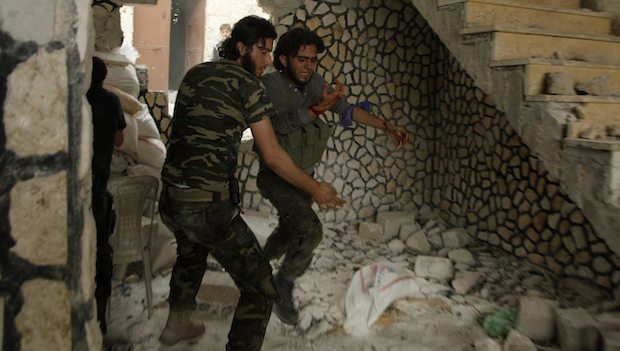
A Free Syrian Army fighter helps his wounded fellow fighter in Al-Amariya district in Aleppo on May 8, 2014. (REUTERS/Ammar Abdullah)
In a safe house close to the Turkish border a group of injured rebels in various states of repair—or disrepair—bask in the sunshine. Many of them are recovering from the recent Al-Anfal Operation in Latakia governorate, on Syria’s Mediterranean coast.
Dr. Safi Dabdoub explains that his private hospital in the Hama countryside was turned into a military headquarters by the government. “They vandalized it, defecated in the elevators and arrested my son, a second-year medical student, because I was treating the injured,” he says. Having lost everything, Dabdoub decided to become a traveling medic attending to the rebels’ wounds.
Most fighters here are Syrians, as well as some North Africans and a smattering of Westerners. As I walk in with the doctor, I exchange a glance with a Western fighter who clearly wants to remain anonymous. “Pakistani?” I ask. His Syrian friend responds on his behalf with a knowing smile: “Homsi.” Laughter rings out; there is no way the fighter in the wheelchair looks like he’s from Homs.
One of Dr. Dabdoub’s patients, Fadil, a fighter from the Suqour Al-Sham brigade, tells me that in the premier league of courage British fighters are ranked high. “They just keep on attacking, they are fearless,” he says. He recalls how he had to calm one Englishman who wanted to know where the front line was before even entering Syria. What happened to him? “He achieved his goal in the first battle, may God accept him.”
The presence of foreign fighters in Syria’s conflict comes with its problems, even for the rebels. Mustapha Al-Khadr, an activist and a former administrator of a local Shari’a court, says: “The problem is that many of them don’t know a word [of Arabic]; they end up with ISIS [the Islamic State of Iraq and Syria] and are told to go and fight in Foa’ and end up fighting rebels in Saraqeb, thinking that they are the regime. They are infiltrated.”
Khadr explains that “some of them [Western fighters] say that they are the Muhajiroun [“emigrants”] and we are the Ansar [“the Helpers”]. It is true, but it is also problematic.” In Islamic Prophetic sira (biographical) literature, the Muhajiroun are given political authority over the Ansar in the nascent Islamic state following the Prophet’s death, and so there is an assumption by some of the foreign fighters that they should also have political power. This is unacceptable to many Syrian rebels.
Dr. Dabdoub’s patient Wisam is gruff as we enter his room. His entire body is marked with war. His arm has a metal contraption sticking out of the bone to keep it still. His stomach is punctured, his insides held in by bandages that are changed regularly. His legs and arm are stitched up to resemble something out of Mary Shelley’s Frankenstein. The smell of blood, flesh and antiseptic is so pervasive that the men who share the room with him don’t even notice. Still, Dr. Dabdoub is optimistic: “He’ll live,” he says, pressing his stomach almost carelessly.
I couldn’t help asking Wisam whether it was all worth it. Fadil, who had been watching a Syrian soap, piped up, holding his stump: “Look, I am free. Before, I had to take permission from security services just to get married; now I do what I like.” He smiles: “It is God who started this, not Bashar, not Bandar, and the revolution, whatever happens, stands. We will finish this.” Muhammad, a civilian from Hama who had been sitting quietly, observing, throws in his story. He shows me his foot and says: “They pierced me with a metal rod because I sold eggplants to protestors. You want to see more?” He shows me his chest, covered in cigarette burns. Civilian or fighter, every man has a story.
For many of these men, even if Homs and Aleppo fall and Bashar Al-Assad wins his election, the revolution still stands. It is as if this Pandora’s Box will not be closed unless there is either an all-out victory or the international community intervenes. And Abu Ali, a commander from the Ansar Al-Sham group, tells me another military operation is in the pipeline.
This article was originally published in The Majalla.
All views expressed in this blog post are those of the author and do not necessarily represent the views of, and should not be attributed to, The Majalla magazine or Asharq Al-Awsat newspaper.
